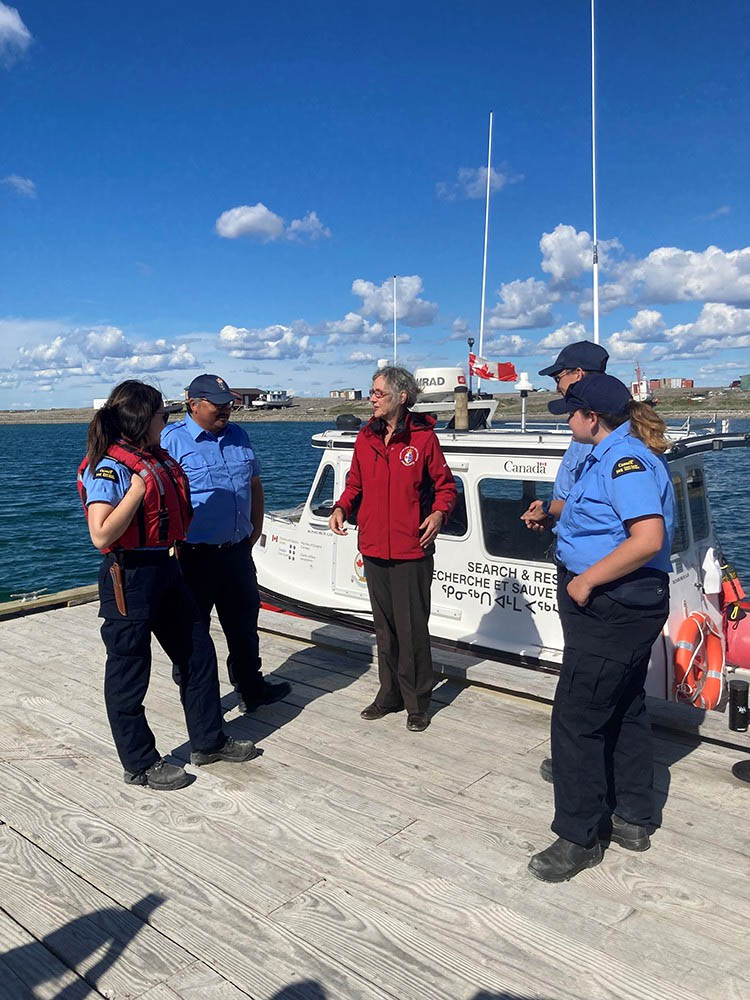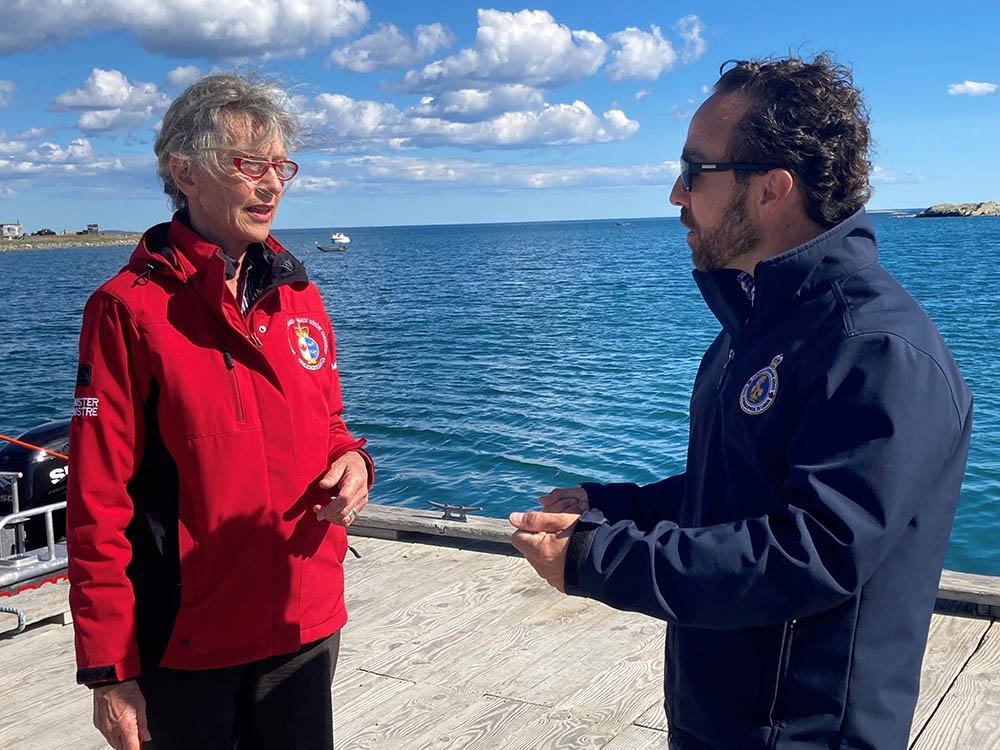News Release from: Fisheries and Oceans Canada, August 2022

Rankin Inlet, Nunavut – The Arctic Ocean provides critical resources for northern communities across Canada. It is a key transportation corridor for community resupply, provides food resources, and is a part of northern cultural identity. Ensuring these waters are safe is crucial. This is why the Government of Canada is making significant investments to improve marine safety across Canada’s North under the next phase of the Oceans Protection Plan.
Today, the Minister of Fisheries, Oceans and the Canadian Coast Guard, the Honourable Joyce Murray, announced funding for two separate Arctic initiatives:
1. Improving the Canadian Hydrographic Service (CHS) in the Arctic
This new funding of $84 million will enable the CHS to continue their work to improve modern hydrographic services of mapping the seafloor, which directly contribute to safe navigation in the Arctic. The CHS will undertake hydrographic surveys using new technologies such as autonomous survey vessels and satellite-based remote sensing, to meet the challenges of Arctic hydrography, and provide new nautical charts and products in priority areas. This funding will also enable communities in the Arctic and Canada to work with the CHS to collect and use hydrographic data, advancing their understanding of the local seafloor.
Through previous funding from the Oceans Protection Plan, the CHS was able to increase our hydrographic coverage of the Arctic’s shipping corridors and release 72 new Electronic Navigational Charts. Today’s funding will build upon these accomplishments and further improve marine safety in the Arctic.
2. Enhancing the Canadian Coast Guard (CCG) in the Arctic
This new funding of $24.7 million will enhance the CCG’s response capabilities at Rankin Inlet. Established under the first phase of the Oceans Protection Plan, the Canadian Coast Guard’s first Arctic search and rescue station opened in Rankin Inlet, Nunavut, in August 2018 as an Inshore Rescue Boat station. With this additional funding, the station will be enhanced to an Arctic Marine Response Station.
The CCG will use these resources to hire and train additional crew from local communities; extend the station’s operational season by one month annually beginning in 2023, to better align with the full ice-free boating season in the area; procure an additional search and rescue vessel, purpose-built for Arctic operations; and, undertake additional infrastructure improvements to enhance operational capabilities.
The CCG’s Station in Rankin Inlet provides maritime search and rescue services during the open-water season. Crews respond to distress calls that range from capsized vessels taking on water to medical emergencies. Its crew is an important part of the emergency preparedness and response system in the North, working together with the CCG Auxiliary, Inuit, and local first responders to increase maritime safety in Arctic waters.
The Oceans Protection Plan is a Canadian success story. When Indigenous Peoples, industry, communities, academia, and government work together to protect our environment, grow our economy, and support good jobs across the country, we deliver real results. A renewed and expanded Oceans Protection Plan will keep our oceans and coasts healthy, advance reconciliation, and build a clean future for our children and grandchildren.
These significant investments in the Canadian Hydrographic Service and the Canadian Coast Guard will contribute to safer waters in the Arctic and help protect coastal communities across the region. By collaborating with communities across the North, we are ensuring those who use and rely on Arctic waters daily will be safer than ever before.”
The Honourable Joyce Murray, Minister of Fisheries, Oceans and the Canadian Coast Guard
“Thanks to the new investment in the Oceans Protection Plan, we are enhancing the Canadian Coast Guard’s ability to provide essential search and rescue operations, icebreaking, and critical supplies to northern communities. By working with First Nations, Inuit, Métis, and coastal communities, we are ensuring our coastal ecosystems remain protected and local communities have access to the goods they need.”
The Honourable Omar Alghabra, Minister of Transport
“These investments will enhance key strategic assets to our Arctic operations. The Canadian Coast Guard has committed to shaping our Arctic programs and services in partnership with the communities we serve, and it is only through working directly with Inuit, First Nations and Métis peoples that we can expect to deliver on that mandate. This new funding will allow us to hire additional personnel and procure enhanced equipment that will allow search and rescue crews to operate even more effectively using crucial local Indigenous knowledge and expertise.”
Mario Pelletier, Commissioner of the Canadian Coast Guard
“This renewed funding will allow us to continue our important work in the Arctic. Since the beginning of the Oceans Protection Plan in 2016, we have made significant progress in surveying and charting Arctic waters. We look forward to continuing this work to further advance safe navigation in the Arctic.”
Geneviève Béchard, Director General, Canadian Hydrographic Service

Quick facts
- Since 2016, the Government of Canada has dedicated $3.5 billion to the Oceans Protection Plan, making it the largest investment Canada has ever made to protect its coasts and waterways.
- The funding announced today is part of the Government of Canada’s Budget 2022 commitment to provide $2 billion over nine years to renew Canada’s Oceans Protection Plan and expand its work into new areas.
- Since the launch of the Oceans Protection Plan, the Canadian Hydrographic Service has:
- completed modern surveys and 49 Electronic Navigational Charts for 23 high-priority commercial ports;
- advanced modern hydrography in the Arctic through approximately 112,000 km2 of surveys, and releasing 72 new Electronic Navigational Charts and 28 paper charts;
- surveyed 85,000 km2 in Canada’s near-shore areas; and,
- developed innovative digital navigation products for six commercial ports and waterways.
- Since the CCG Station’s launch in Rankin Inlet, local crews have responded to three search and rescue incidents in 2018, one in 2019, and six in 2020. They also participated in several training exercises with various partners including the local Canadian Coast Guard Auxiliary unit, and fire rescue and emergency services.
- Today’s funding will build upon these accomplishments and further improve marine safety in the Arctic.






